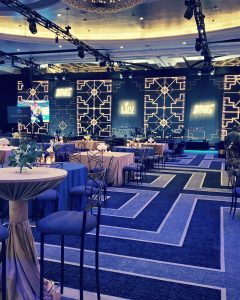What Does an Event Designer Do?


In today’s vibrant world of celebrations, gatherings, and corporate functions, the role of an event designer has become increasingly vital. From weddings and birthdays to corporate retreats and conferences, event designers bring visions to life through creativity, organization, and attention to detail. But what exactly does an event designer do? Let’s explore the multifaceted responsibilities and skills that define this exciting profession.
Understanding the Role of an Event Designer
At its core, an event designer is responsible for creating an event’s overall aesthetic and experience. This role encompasses various tasks, from conceptualizing themes to selecting decor, lighting, and layout. Unlike event planners, who focus primarily on logistics and coordination, event designers concentrate on the visual and experiential elements that make an event memorable.
Concept Development
One of an event designer’s first responsibilities is developing a concept that aligns with the client’s vision and goals. This involves understanding the purpose of the event and the message that the client wants to convey. An event designer often collaborates with clients to brainstorm ideas and refine them into a cohesive theme. This stage is crucial, as it sets the tone for every decision made throughout the design process.
Design and Aesthetics
Once the concept is established, the event designer delves into the event’s aesthetics. This includes selecting color palettes, materials, and design elements that will be incorporated into the event. Whether it’s a sophisticated corporate gathering or a whimsical wedding, the designer ensures that every detail is visually appealing and consistent with the theme.
Design choices also extend to furniture and layout. An event designer must consider how the arrangement of tables, chairs, and decor will impact the event’s flow and the guests’ comfort. The right design can enhance guest interaction and create a more enjoyable experience.
Budget Management
While creativity is key, budget management is equally essential. An event designer works within a specified budget to bring the client’s vision to life. This involves sourcing materials, decor, and services that fit within financial constraints while still achieving the desired aesthetic. It requires strong negotiation skills and a keen understanding of value to ensure the best possible outcome for the client.
Vendor Coordination
An event designer typically collaborates with various vendors to bring their vision to fruition. This can include florists, lighting specialists, furniture rental companies, and catering services. Coordinating with these vendors is crucial to ensure that all elements align with the overall design and that the event runs smoothly. Effective communication and relationship-building are key components of this aspect of the job.
On-Site Management
An event designer’s skills truly shine on the day of the event. They oversee the execution of the design, ensuring that everything comes together as planned. This involves setting up decor, arranging furniture, and managing the timeline for setup. The event designer must be prepared to troubleshoot any issues that arise and adapt to last-minute changes while maintaining the vision for the event.
Guest Experience
An often overlooked aspect of event designer’s role is enhancing the guest experience. This goes beyond aesthetics to include sensory elements such as lighting, sound, and fragrance. The right ambiance can significantly impact how guests perceive an event and their enjoyment. An event designer carefully curates these elements to create a cohesive and immersive environment.
Post-Event Evaluation
Once the event concludes, an event designer’s work isn’t finished. They often participate in post-event evaluations to assess what worked well and what could be improved for future events. Gathering feedback from clients and guests can provide valuable insights into the effectiveness of the design and overall execution. This reflective process helps the designer grow professionally and strengthens their client relationships by demonstrating a commitment to continuous improvement.
Creativity and Vision
Event designers must be highly creative and able to envision how various elements will come together. They should stay updated on design trends and think creatively to create unique and engaging experiences. Given the complexity of event design, strong organizational skills are vital. Designers must juggle multiple tasks, manage timelines, coordinate with various vendors, and keep track of details. Effective project management ensures that everything runs smoothly.
Communication Skills
Strong communication skills are essential for interacting with clients, vendors, and team members. Event designers must be able to articulate their ideas clearly and negotiate effectively to bring their visions to life. Events rarely go exactly as planned. An event designer must be adept at problem-solving, think on their feet, and handle unexpected challenges gracefully and composure.
Educational Background
While there is no specific educational path to becoming an event designer, many professionals in the field have backgrounds in design, hospitality, or event management. Pursuing relevant degrees or certifications can provide valuable skills and knowledge that enhance a designer’s effectiveness. Additionally, hands-on experience is invaluable. Before moving into more specialized roles, many event designers start their careers in entry-level positions, such as event planning assistants or decor coordinators.
The Future of Event Design
As technology continues to evolve, so does the world of event design. Virtual and augmented reality innovations are opening new avenues for creating immersive experiences. Event designers must adapt to these changes, integrating technology to enhance guest engagement. Sustainability is also becoming increasingly important in event design. Many clients seek eco-friendly options, and event designers must consider incorporating sustainable practices into their designs without compromising aesthetics.
An event designer plays a crucial role in shaping the success of an event through creativity, organization, and attention to detail. From conceptualizing themes to overseeing execution, event designers bring visions to life while enhancing the guest experience. As the industry continues to evolve, these professionals will be at the forefront of creating memorable and impactful events, showcasing the power of design in bringing people together. Whether you’re planning a wedding, corporate retreat, or social gathering, understanding the role of an event designer can help you appreciate the artistry and effort that goes into creating unforgettable experiences.
